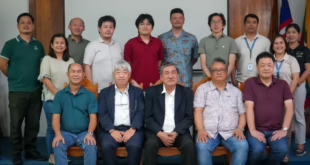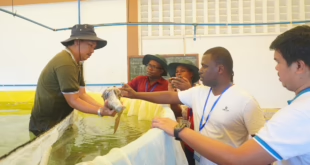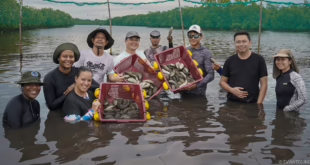By Development Communication Section
 Shrimp farmers are advised not to stock their ponds during cold months from November to February because shrimp get stressed when temperatures dip below 27°C, predisposing them to diseases.
Shrimp farmers are advised not to stock their ponds during cold months from November to February because shrimp get stressed when temperatures dip below 27°C, predisposing them to diseases.
A study by SEAFDEC/AQD scientist Dr. Eleonor Tendencia has shown that a drop in temperature weakens the immune response of shrimp making them prone to infection. The study cites the pattern of white spot syndrome virus outbreaks in tiger shrimp (Penaeus mondon) when atmospheric temperatures are low.
Victor Emmanuel Estilo, shrimp pond culture expert of the Southeast Asian Fisheries Development Center – Aquaculture Department (SEAFDEC/AQD), said that culture may be done during the warmer months from April to October.
Estilo also recommends that shrimp farmers, especially those whose facilities are not “biosecure,” to consider having only one production run per year within the warmer months. Shrimp farmers also need to take extra precautions to prevent the entry of diseases by using clean fry, filtration systems, tire and foot baths, crab fences and bird-scaring devices among others.
To maximize utilization of ponds, Estilo suggests growing high-value marine fish such as snappers (Lutjanus spp.) and Asian sea bass (Lates calcarifer) during cold months. He also said that growing these fish species in shrimp ponds is advantageous since they prey on disease-carrying crustaceans.
Meanwhile, Dr. Tendencia’s study also showed that several days of continuous rain contributes to the lowering of the pond water’s temperature and salinity. Fluctuations in salinity are also linked with disease outbreaks.
Recurring disease outbreaks are considered the most serious problem faced by shrimp farmers. With this constraint, SEAFDEC/AQD intensified its research activities on identification, detection, prevention, and treatment of diseases plaguing the industry. It has also come up with protocols and is studying other variables that may prevent the occurrence of diseases in shrimp stocks.
SEAFDEC/AQD, an international treaty organization aims to promote aquaculture development. It is currently working to boost the shrimp farming industry under its banner program “Oplan Balik Sugpo”.
 SEAFDEC/AQD Southeast Asian Fisheries Development Center | Aquaculture Department
SEAFDEC/AQD Southeast Asian Fisheries Development Center | Aquaculture Department



